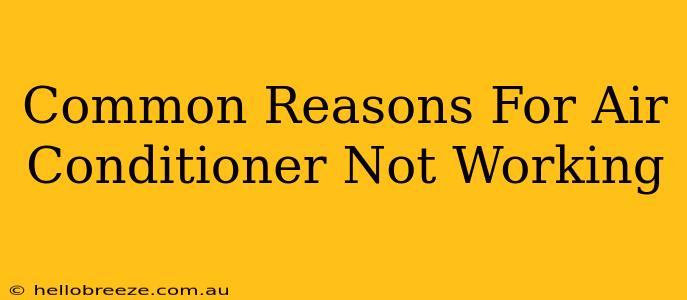Is your air conditioner refusing to cooperate on a sweltering summer day? Don't sweat it! While a malfunctioning AC can be incredibly frustrating, understanding the common culprits can save you time, money, and a lot of discomfort. This guide breaks down the most frequent reasons your air conditioner might be on the fritz, helping you diagnose the problem and decide whether a professional is needed.
Top Reasons Your AC Isn't Cooling
Several factors can prevent your air conditioner from performing its vital cooling function. Let's explore some of the most common:
1. Dirty Air Filter:
This is the easiest and most common fix. A clogged air filter restricts airflow, forcing your AC unit to work harder and potentially leading to overheating and failure. Regular filter changes (ideally every 1-3 months) are crucial for maintaining efficiency and extending the lifespan of your system. Simply remove the old filter, replace it with a clean one, and see if that solves the problem.
2. Frozen Evaporator Coil:
A frozen evaporator coil is often a symptom of restricted airflow (due to a dirty filter, clogged vents, or other obstructions). The ice buildup prevents proper heat absorption, resulting in no cool air. Before attempting to thaw it yourself (which can be risky), check the air filter and ensure all vents are open. A professional may be needed to address more serious underlying issues.
3. Refrigerant Leaks:
Refrigerant is the crucial element that facilitates cooling. Leaks can lead to significantly reduced cooling power or complete failure. Detecting a refrigerant leak requires specialized tools and knowledge; this is a job best left to a qualified HVAC technician. Attempting to repair this yourself can be dangerous and may void any warranties.
4. Electrical Issues:
Problems with the electrical components, such as a tripped breaker, faulty wiring, or a malfunctioning capacitor, can prevent your AC from starting or functioning correctly. Check your circuit breaker box for tripped breakers. If the problem persists, call an electrician or HVAC professional to inspect the electrical system.
5. Compressor Problems:
The compressor is the heart of your air conditioning system. If it fails, your AC won't cool at all. Compressor issues are often complex and expensive to repair, potentially requiring replacement. A professional diagnosis is essential to determine the extent of the damage.
6. Clogged Condenser Coils:
Similar to the evaporator coil, a dirty condenser coil (located outside) restricts airflow and reduces efficiency. Clean the coils regularly with a coil cleaning brush or solution to maintain optimal performance. However, if the coils are severely damaged, professional assistance might be necessary.
7. Thermostat Issues:
A malfunctioning thermostat can prevent your AC from turning on or operating correctly. Try changing the batteries in your thermostat as a first step. If the problem persists, it might need to be replaced.
When to Call a Professional
While some issues are easily addressed with simple troubleshooting, others require the expertise of a qualified HVAC technician. Call a professional if:
- You suspect a refrigerant leak.
- The compressor is not working.
- You've tried basic troubleshooting and the problem persists.
- You're uncomfortable working with electrical components.
Regular maintenance, including filter changes and coil cleaning, can significantly reduce the likelihood of major problems and prolong the life of your air conditioner. By understanding these common issues, you can take proactive steps to keep your home cool and comfortable all summer long.

